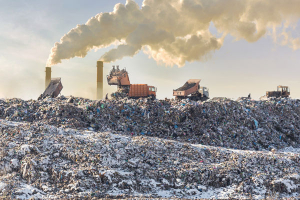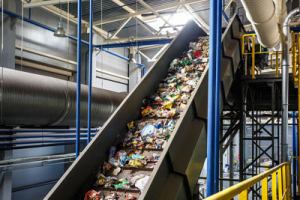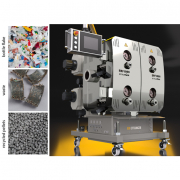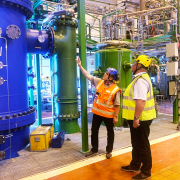A New Solution for Plastic Recycling
What has the plastic waste crisis taught us about recycling innovation? UK-based company Greenback Recycling Technologies Ltd. – in partnership with chemical recycling company Enval – presents a microwave-induced pyrolysis solution for dealing with low-density plastic waste. A specialist article by the company:
It is estimated that eight billion tons of plastic have been produced since the 1950s. Of that total figure, only 10 percent, at best, has ever been recycled. Plastic recycling has taken place for decades and there is no denying that mechanical recycling works well for rigid plastics such as PET and mono materials. Currently, however, most plastic waste still ends up being dumped, burned or sent to landfills. The reasons for this are manifold. Some plastic substrates are manufactured from multiple polymers – laminated or coextruded. This makes them difficult to recycle as the various materials cannot be easily separated and sent to the relevant waste channels. Other forms of plastic are too expensive to collect and sort so it is not economic to recycle them. This applies to most plastic films. Moreover, in the main, plastic contaminated with food cannot be recycled either.
As a result, plastic waste has become a runaway global problem and it is only set to get worse. According to the United Nations Environment Programme, the world produces three hundred million tons of plastic waste each year. In contrast, the world’s plastic recycling capacity is estimated to be forty-six million tons a year according to the Organisation for Economic Co-operation and Development (OECD). Meanwhile, plastic production is projected to double by 2040. By the same year, the amount of plastic waste finding its way into the oceans is expected to triple to 29 million tons.
Reduce. Reuse. Recycle. Rethink
Across the world, think tanks and thought leaders, including scientists, academics and environmentalists, are united in agreement. The current approach to dealing with plastic waste simply is not working. The statistics show that it is a drastic problem and to address it requires radical thinking – and an equally radical solution. Any such solution must adopt a systems approach. Upstream, more needs to be done to reduce the production of virgin plastics and to ensure consumer packaged goods companies (CPGs) are supplied in packaging that is reusable or refillable.
Many individual nations and regional trade blocs have implemented legislation to encourage these changes in corporate behavior, but these fragmented efforts equate to local answers to a global issue. There is currently no worldwide regulator or treaty for the plastics industry and perhaps this needs to change. Downstream, there is a clear and present need to increase our recycling capabilities. Investment is key – but so too is innovation. Simply expanding our existing mechanical recycling infrastructure through large-scale plants may alleviate the problem but it certainly will not solve it. This is in part due to the cost and difficulties in recycling plastic waste as previously mentioned.
New technology and new methodologies must be developed to provide a much-needed boost to our current recycling activity. Greenback is proud to be at the forefront of leading efforts in this area.
New innovations. New possibilities
Working closely with UK-based chemical recycling company Enval, Greenback is helping to pioneer a unique microwave-induced pyrolysis solution for dealing with low-density plastic waste. This waste includes plastic aluminum laminates where aluminum foil is combined with plastic substrates. Thanks to its lightweight, flexible nature as well its ability to provide an effective barrier against light, moisture and gases such as oxygen, laminated flexible plastic packaging has been widely adopted by the world’s major brands for application across consumer packaged goods (CPGs) ranging from food to cosmetics.
Flexible laminated plastic packaging enables manufacturers to reduce overall pack weight, transport costs and attributable vehicle emissions, not to mention the weight of packaging waste for disposal post-use. As a result, its use is increasing with more than 160,000 tons of this form of packaging entering the UK marketplace each year.
The process being realized by Greenback and Enval enables plastic aluminum laminates to be kept out of landfill and recycled in a way that is clean, efficient and economical. It transforms the material into oil feedstock (Py-Oil) which can be used to produce new plastic, effectively closing the loop on this waste. The aluminum is also recovered with a purity exceeding 98 percent enabling it to be re-smelted.
Physical and digital advances
Pyrolysis recycling can be further used to recycle post-consumer plastic waste, which would ordinarily be destined for landfill. The pyrolysis plants themselves are scalable and quick to commission. A single module can process 2.5kt (2,500 tons) per annum of hard-to-recycle plastic waste and can be neatly up-scaled in 2.5kt increments to fit the size of the waste stream available. As well as driving new developments in physical processes, innovation is helping to deliver new advances in digital technology, which can assist with the current waste crisis. Greenback’s “eco2Veritas circularity platform” for example provides complete traceability across the plastic recycling process.
It helps to enhance the value of Py-Oil by giving CPG companies the reassurance that they are using recyclate that has come from legitimate sources where the provenance of the material is fully verified – from the point of collection to use. This provenance is particularly important when it comes to enabling recyclate to be used instead of virgin polymer in much needed food contact packaging applications. It also has the potential to be of significant benefit because of the twenty billion kilos of plastic currently used for packaging in Europe, almost 50 percent of it is employed by the food and drink industry.
In answer to the question, what has the plastic waste crisis taught us about recycling innovation? That it is an absolute necessity. It may not provide a silver bullet for the current situation facing the world. But it can, and is, making a significant difference.
(Published in GLOBAL RECYCLING Magazine 2/2022, Page 33, Photo: PHD Marketing Limited / Greenback Recycling Technologies)











